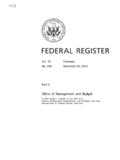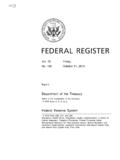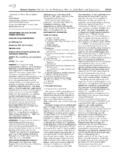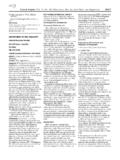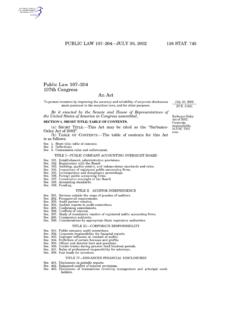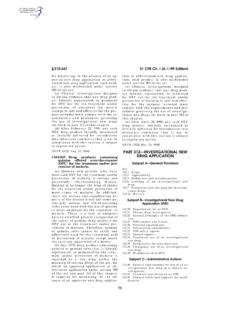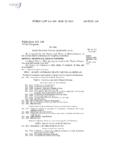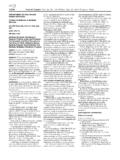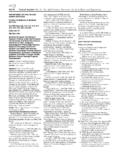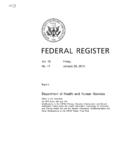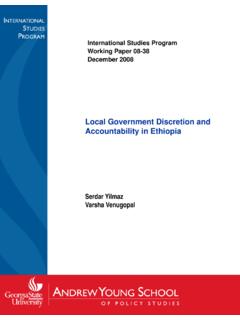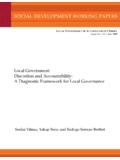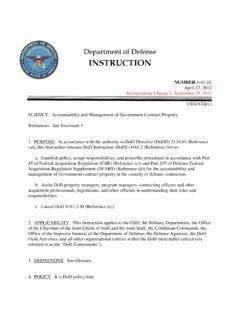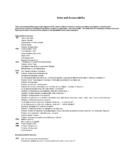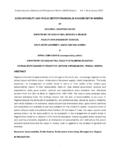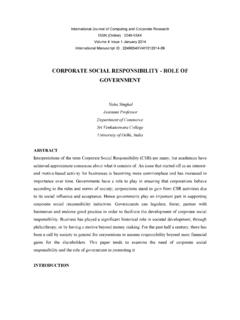Transcription of Presidential Documents - gpo.gov
1 Presidential Documents25335 Federal Register/ Vol. 83, No. 106 / Friday, June 1, 2018 / Presidential Documents Executive Order 13837 of May 25, 2018 Ensuring Transparency, accountability , and Efficiency in Taxpayer-Funded Union Time Use By the authority vested in me as President by the Constitution and the laws of the United States of America, including section 301 of title 3, United States Code, and section 7301 of title 5, United States Code, and to ensure the effective functioning of the executive branch, it is hereby ordered as follows: Section 1.
2 Purpose. An effective and efficient government keeps careful track of how it spends the taxpayers money and eliminates unnecessary, inefficient, or unreasonable expenditures. To advance this policy, executive branch employees should spend their duty hours performing the work of the Federal government and serving the public. Federal law allows Federal employees to represent labor organizations and perform other non-agency business while being paid by American taxpayers (taxpayer-funded union time). The Congress, however, has also instructed the executive branch to interpret the law in a manner consistent with the requirements of an effective and efficient government .
3 To that end, agencies should ensure that taxpayer-funded union time is used efficiently and authorized in amounts that are reasonable, necessary, and in the public interest. Federal employees should spend the clear majority of their duty hours working for the public. No agency should pay for Federal labor organizations expenses, except where required by law. Agen-cies should eliminate unrestricted grants of taxpayer-funded union time and instead require employees to obtain specific authorization before using such time. Agencies should also monitor use of taxpayer-funded union time, ensure it is used only for authorized purposes, and make information regard-ing its use readily available to the public.
4 Sec. 2. Definitions. For purposes of this order, the following definitions shall apply: (a) Except for purposes of section 4 of this order, agency has the meaning given the term in section 7103(a)(3) of title 5, United States Code, but includes only executive agencies. For purposes of section 4 of this order, agency has the meaning given to Executive agency in section 105 of title 5, United States Code, but excludes the government accountability Office. (b) Agency business shall mean work performed by Federal employees, including detailees or assignees, on behalf of an agency, but does not include work performed on taxpayer-funded union time.
5 (c) Bargaining unit shall mean a group of employees represented by an exclusive representative in an appropriate unit for collective bargaining under subchapter II of chapter 71 of title 5, United States Code. (d) Discounted use of government property means charging less to use government property than the value of the use of such property, as deter-mined by the General Services Administration, where applicable, or other-wise by the generally prevailing commercial cost of using such property. (e) Employee has the meaning given the term in section 7103(a)(2) of title 5, United States Code, except for purposes of section 4 of this order, in which case it means an individual employed in an Executive VerDate Sep<11>2014 17:16 May 31, 2018 Jkt 244001 PO 00000 Frm 00001 Fmt 4790 Sfmt 4790 E:\FR\FM\ 01 JNE1sradovich on DSK3 GMQ082 PROD with PRES DOCS25336 Federal Register/ Vol.
6 83, No. 106 / Friday, June 1, 2018 / Presidential Documents agency, according to the meaning given that term in section 105 of title 5, United States Code, but excluding the government accountability Office. (f) Grievance has the meaning given the term in section 7103(a)(9) of title 5, United States Code. (g) Labor organization has the meaning given the term in section 7103(a)(4) of title 5, United States Code. (h) Paid time shall mean time for which an employee is paid by the Federal government , including both duty time, in which the employee per-forms agency business, and taxpayer-funded union time.
7 It does not include time spent on paid or unpaid leave, or an employee s off-duty hours. (i) Taxpayer-funded union time shall mean official time granted to an employee pursuant to section 7131 of title 5, United States Code. (j) Union time rate shall mean the total number of duty hours in the fiscal year that employees in a bargaining unit used for taxpayer-funded union time, divided by the number of employees in such bargaining unit. Sec. 3. Standards for Reasonable and Efficient Taxpayer-Funded Union Time Usage. (a) No agency shall agree to authorize any amount of taxpayer- funded union time under section 7131(d) of title 5, United States Code, unless such time is reasonable, necessary, and in the public interest.
8 Agree-ments authorizing taxpayer-funded union time under section 7131(d) of title 5, United States Code, that would cause the union time rate in a bargaining unit to exceed 1 hour should, taking into account the size of the bargaining unit, and the amount of taxpayer-funded union time antici-pated to be granted under sections 7131(a) and 7131(c) of title 5, United States Code, ordinarily not be considered reasonable, necessary, and in the public interest, or to satisfy the effective and efficient goal set forth in section 1 of this order and section 7101(b) of title 5, United States Code.
9 Agencies shall commit the time and resources necessary to strive for a negotiated union time rate of 1 hour or less, and to fulfill their obligation to bargain in good faith. (b) (i) If an agency agrees to authorize amounts of taxpayer-funded union time under section 7131(d) of title 5, United States Code, that would cause the union time rate in a bargaining unit to exceed 1 hour (or proposes to the Federal Service Impasses Panel or an arbitrator engaging in interest arbitration an amount that would cause the union time rate in a bargaining unit to exceed 1 hour), the agency head shall report this agreement or proposal to the President through the Director of the Office of Personnel Management (OPM Director)
10 Within 15 days of such an agreement or pro-posal. Such report shall explain why such expenditures are reasonable, necessary, and in the public interest, describe the benefit (if any) the public will receive from the activities conducted by employees on such taxpayer- funded union time, and identify the total cost of such time to the agency. This reporting duty cannot be delegated. (ii) Each agency head shall require relevant subordinate agency officials to inform the agency head 5 business days in advance of presenting or accepting a proposal that would result in a union time rate of greater than 1 hour for any bargaining unit, if the subordinate agency officials anticipate they will present or agree to such a provision.
